Special Round Table: Ukraine and Croatia: Navigating (Post) – War Hopes and Challenges
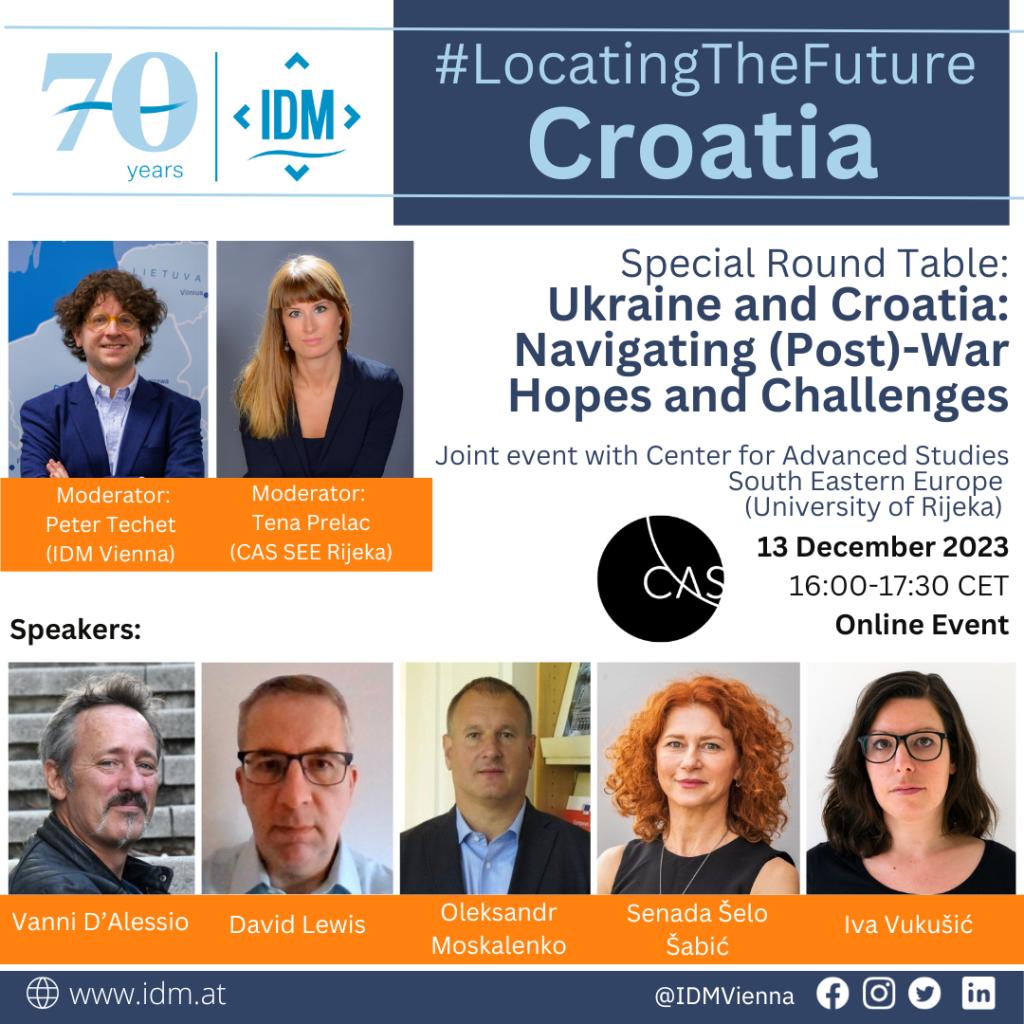

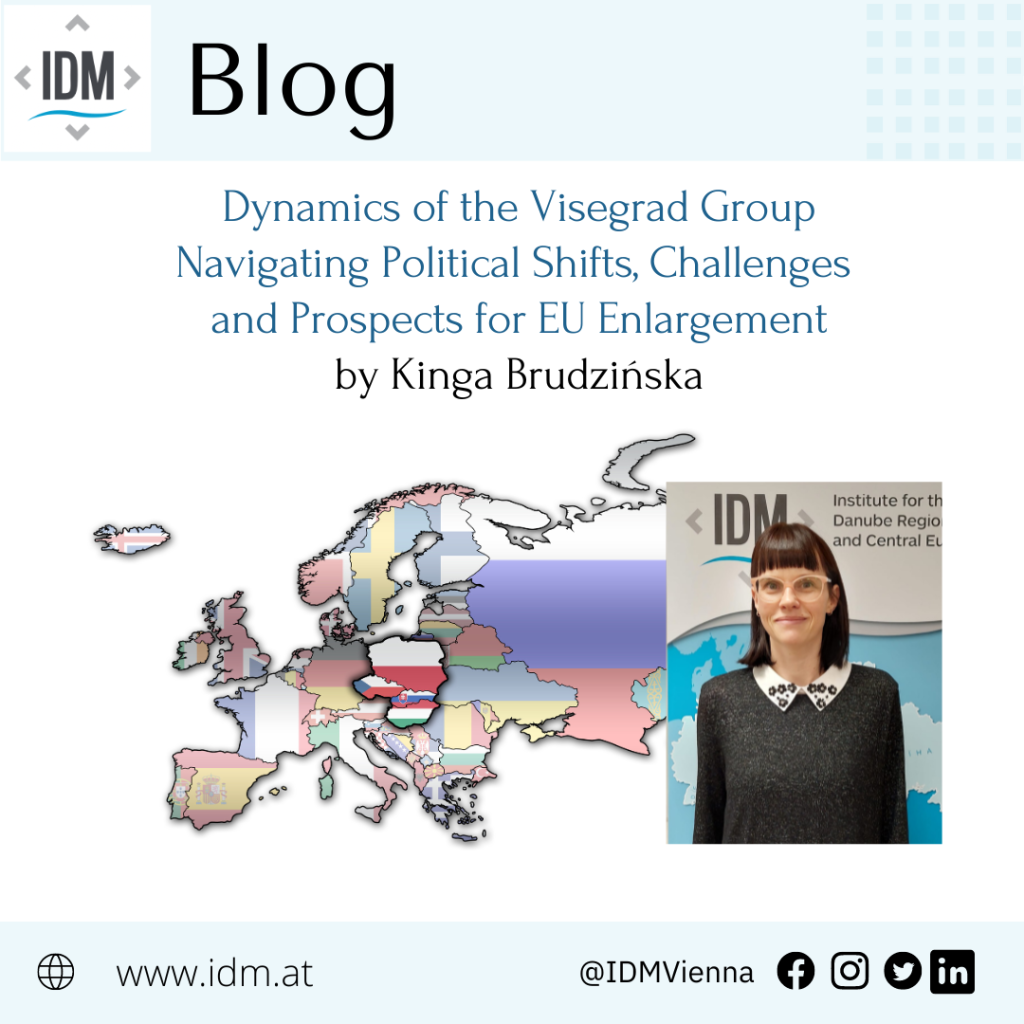
The upcoming European Council meeting on December 14–15 will see key decisions made on EU enlargement – will the Visegrad Group (Czechia, Hungary, Poland, Slovakia) stay (dis)united? Kinga Brudzinska explains what can be expected in her newest piece on the IDM blog.
The political differences in the Visegrad Four (V4) countries that emerged as a result of the elections in Poland (15 October 2023) and Slovakia (30 September 2023) will not significantly impact the dynamics of cooperation among the group. The format remains in crisis due to Hungary’s pro-Russia foreign policy stance and its sceptical approach to the EU’s pro-Ukraine policy direction.
The upcoming European Council meeting on December 14–15, which will see key decisions made on EU enlargement, will once again highlight the lack of unity and cohesion among V4 group members, with Hungary being the outlier. As a result, the V4 will continue to serve as a platform for regional cooperation, but one should not expect a revival of coordinated foreign or European policy as seen in response to the 2015 migration crisis or the “Nutella crisis” in 2017 when the V4 mobilised to fight against the “double standards” of imported food sold in their countries.
What is more, in the long run, the ideological differences are not likely to divide the countries that created the V4, regardless of the political preference of ruling governments. For example, the International Visegrad Fund (IVF), co-managed by V4 countries and supporting regional cooperation projects in the region, or formats such as Think Visegrad—V4 Think Tank Platform, a hub of V4 joint analysis, remain an important aspect of cooperation. On the other hand, there is a threat that due to persisting political differences, the individual V4 countries will seek to engage in alternative formats of regional cooperation. For example, Slovakia and the Czech Republic will most likely invest in the development of the Slavkov Triangle or Central Five Initiative (C5), involving Austria. Poland will focus on rebuilding relations within the Weimar Triangle and will remain active within the Three Seas Initiative (3SI) until the end of President Andrzej Duda’s term in 2025.
What will change and what will not
Poland and the Czech Republic will not allow Hungary, and perhaps Slovakia, to appropriate the V4 as a Eurosceptic or even anti-Western platform. Furthermore, Slovakia will not replace Poland to the same extent as an important partner in activating the V4 format or advocating Slovakia’s own position on the international stage. After its initial declaration, Slovakia will most probably not stick to all its electoral promises related to withholding military aid to Ukraine or pursuing a more assertive European policy. This is because Slovakia does not have a tradition of conducting proactive foreign policy, so it is unlikely Bratislava would use its veto power in Brussels to back Hungary. As the V4’s only eurozone country, Slovakia traditionally advocates for a constructive European policy based on consensus. Robert Fico demonstrated such an approach during his previous term.
Polish-Hungarian relations will not improve, and Hungary will be isolated within the V4 over Russia. Prime Minister Orban deliberately plays the role of a disruptor in the EU and NATO decision-making process, openly challenging the model of liberal democracy and steering the country towards an authoritarian regime. On the other hand, soon-to-be new/old Polish Prime Minister Donald Tusk is known for his critical stance towards Viktor Orban. Bilateral disputes between Slovakia and Hungary (related to Orban’s controversial historical policies) further complicate the situation and isolate Hungary within the V4.
The V4 also faces an image problem in the EU, with a prevailing negative perception of its member countries. Therefore, Poland is not likely to heavily leverage the V4 in the coming years. In recent years, other formats such as the Bucharest Nine (B9), Three Seas Initiative (3SI), Slavkov Triangle, or Central Five Initiative (C5) have gained prominence, with V4 countries actively participating.
Finally, Poland is not necessarily seen by other Visegrad countries as a leader in the region. Poland’s reputation has also been damaged due to the deterioration of the rule of law (Slovakia, under the previous government, became more sceptical of Poland’s actions and pushed V4 activities aside) and the conflict with the Czech Republic over the Turow coal mine.
To sum up, looking back on 2023 and trying to foresee the developments on the international stage in 2024, we can be sure that the V4 will stay on the map of regional groupings in the EU in the years to come and will keep being used as a passive platform for regional cooperation. However, one should not expect a revival of coordinated foreign or European policy among the V4 unless Hungary adjusts its stance on Russia to align with the European mainstream.

Die ungarischsprachige Sendung des öffentlich-rechtlichen Slowakischen Rundfunks führte ein Interview mit Péter Techet über die Gründe für das Erstarken des Antisemitismus als Folge des Nahostkonflikts. Techet analysierte die pro-israelische Haltung vieler rechtspopulistischer Parteien, mit der sie ihre antimuslimischen Haltungen zu verbergen versuchen. Gleichzeitig sprach er über die antisemitischen Elemente des linken und muslimischen „Antizionismus“.
Das gesamte Gespräch (in ungarischer Sprache) ist hier zu hören.
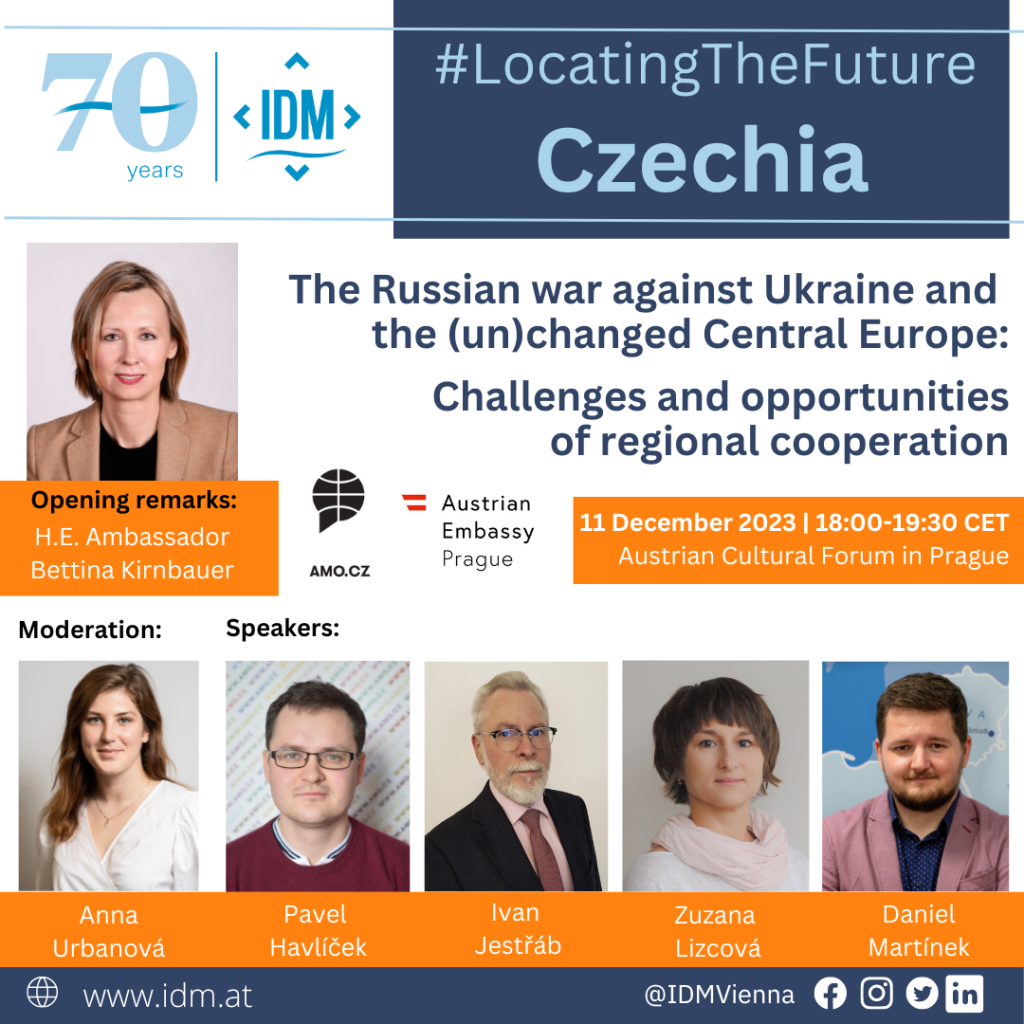
During the past almost two years, the war in Ukraine and its consequences unprecedentedly challenged Central Europe. Military aid, supplies of weapons and equipment, humanitarian support, integration of fleeing Ukrainians, and a fundamentally changed security and geopolitical climate. As other world events such as the terrorist attack on Israel by Hamas unfold, and the war in Ukraine continues, however, the attention on Europe and the willingness to support the attacked Ukraine is starting to wane in some countries, facing rising apathy or denial among societies.
What challenges does Central Europe currently face in connection with the Russian full-scale invasion of Ukraine and the resulting security, military and energy transformation in the region? How can existing cross-border and regional cooperation formats support these transformations? What are the possibilities and limits of common, joint action of Central European states amid the ongoing war? Finally, is the perception of the European Union and its aid to Ukraine changing among the Central European populations? Experts on and from Central Europe examined the current political constellation and cooperation of states in the heart of Europe.
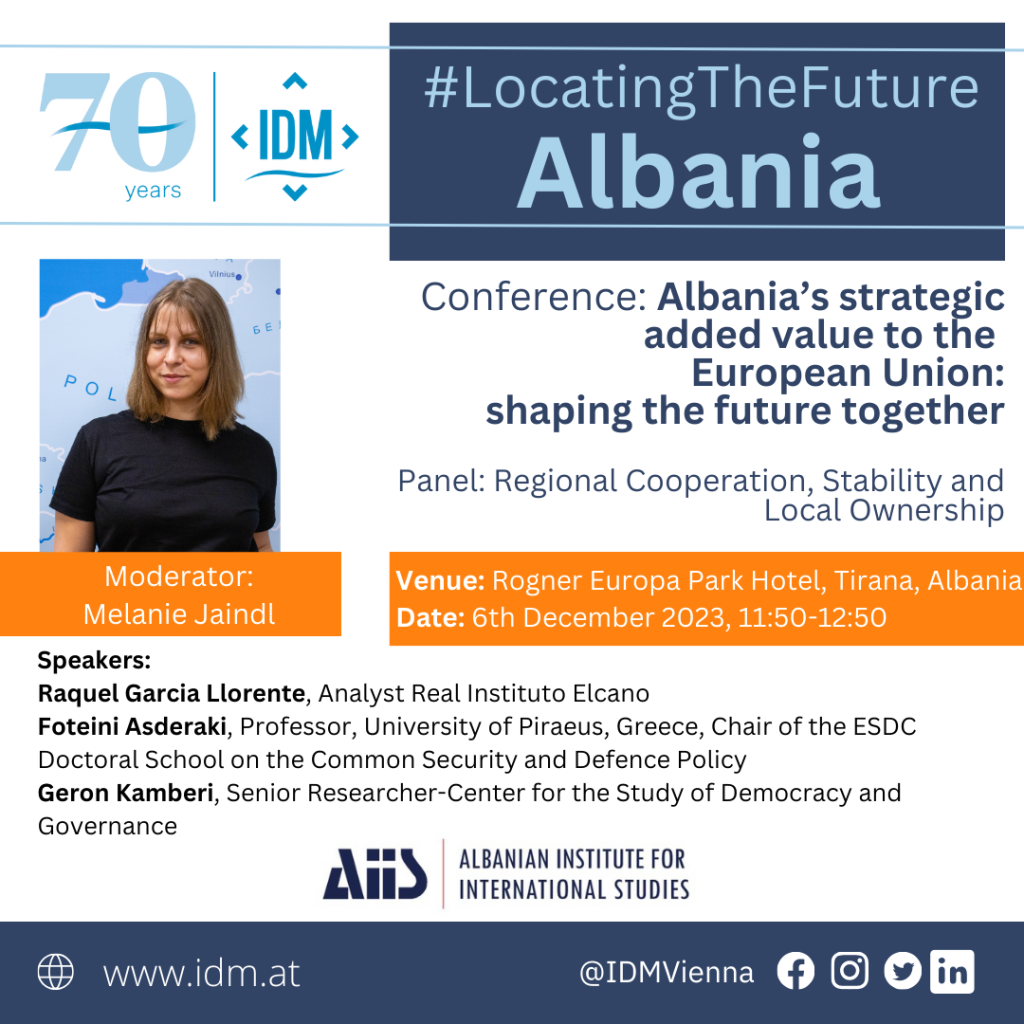
On 6th December, the conference “Albania’s strategic added value to the European Union: shaping the future together” organized by the Albanian Institute for International Studies (AIIS) and co-organized by IDM is took place in Tirana. Research Associate Melanie Jaindl moderated the panel “Regional Cooperation, Stability and Local Ownership” with following speakers:
Raquel Garcia Llorente, Analyst Real Instituto Elcano
Foteini Asderaki, Professor, University of Piraeus, Greece, Chair of the ESDC Doctoral School on the Common Security and Defence Policy
Geron Kamberi, Senior Researcher-Center for the Study of Democracy
and Governance
The conference was visited by important stakeholders such as EU delegates and ambassadors, scholars and policy advisors, and received significant media attention in Albania.
Further co-organizers:
Vor 20 Jahren hat die EU das “Versprechen von Thessaloniki” gegeben: Die Zukunft der Westbalkanländer liege in der EU. Bisher ist nur wenig passiert. Doch seit dem russischen Angriffskrieg auf die Ukraine ist das Thema EU-Erweiterung wieder präsenter geworden. In diesem Podcast schaut Europe Direct Dortmund mit verschiedenen Expert:innen auf die Beitrittsperspektiven der Westbalkan-Länder – in der Reihenfolge, in der sie ihren Beitrittsantrag gestellt haben.
In der zweiten Folge war IDM-Direktor Sebastian Schäffer zu Gast und sprach darüber, was eine Autobahn in Montenegro mit China zu tun hat und was man unter einer unvollständigen Demokratie versteht. Neben Serbien laufen auch mit Montenegro Beitrittsverhandlungen. Den aktuellen Stand und die größten Herausforderungen des kleinen Landes im Beitrittsprozess werden ebenfalls besprochen:
Warum ist Montenegro eine “defizitäre Demokratie”, Herr Schäffer?
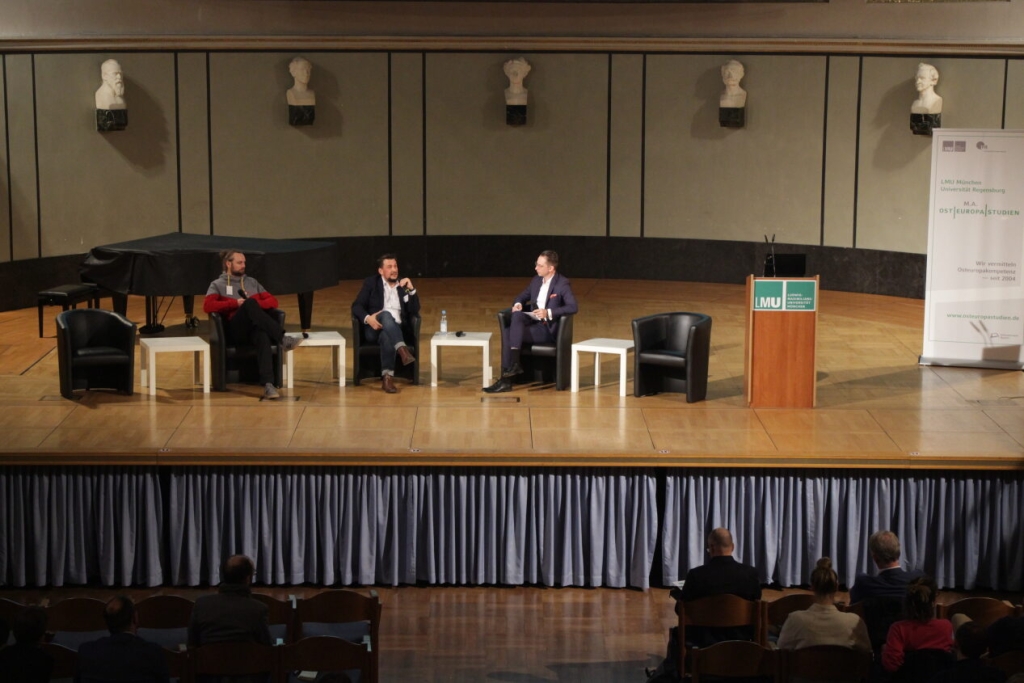
Anlässlich des 20jährigen Jubiläums des Elitestudiengangs Osteuropastudien fand an der Ludwig-Maximilians-Universität eine Festveranstaltung statt. In diesem Rahmen wurden auch Alumni des Studiengangs eingeladen, um über Ihren beruflichen Werdegang nach Abschluss zu sprechen. IDM Direktor Sebastian Schäffer sprach auf dem Panel “NGOs und Osteuropapolitik” über seine Tätigkeit an einem regionalen Think Tank, aber auch über seinen nicht immer geradlinig verlaufenden Karriereweg. Zudem wurden die Möglichkeiten eines Traineeships am IDM präsentiert, eine Zusammenarbeit mit dem Studiengang, in dem auhch Pflichtpraktika vorgesehen sind, würde sich anbieten. Mit Rebecca Thorne arbeitet inzwischen eine weitere Alumna am IDM.
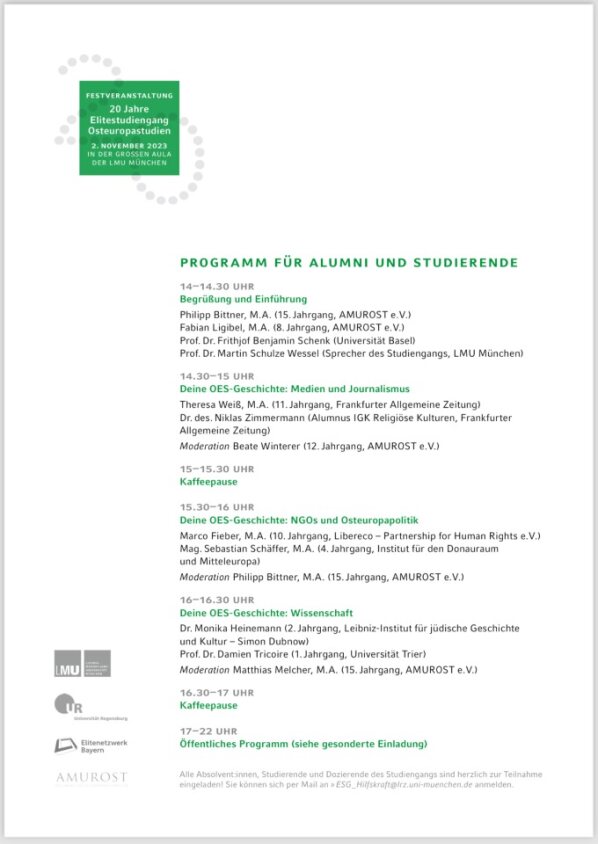
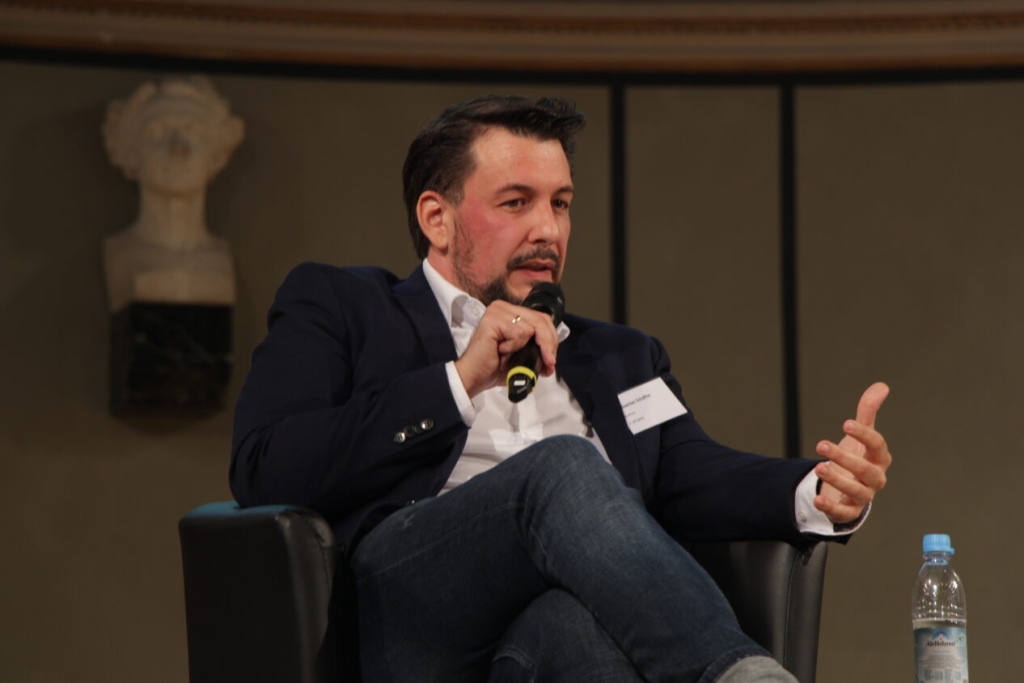
Fotos (c) Martin Penev
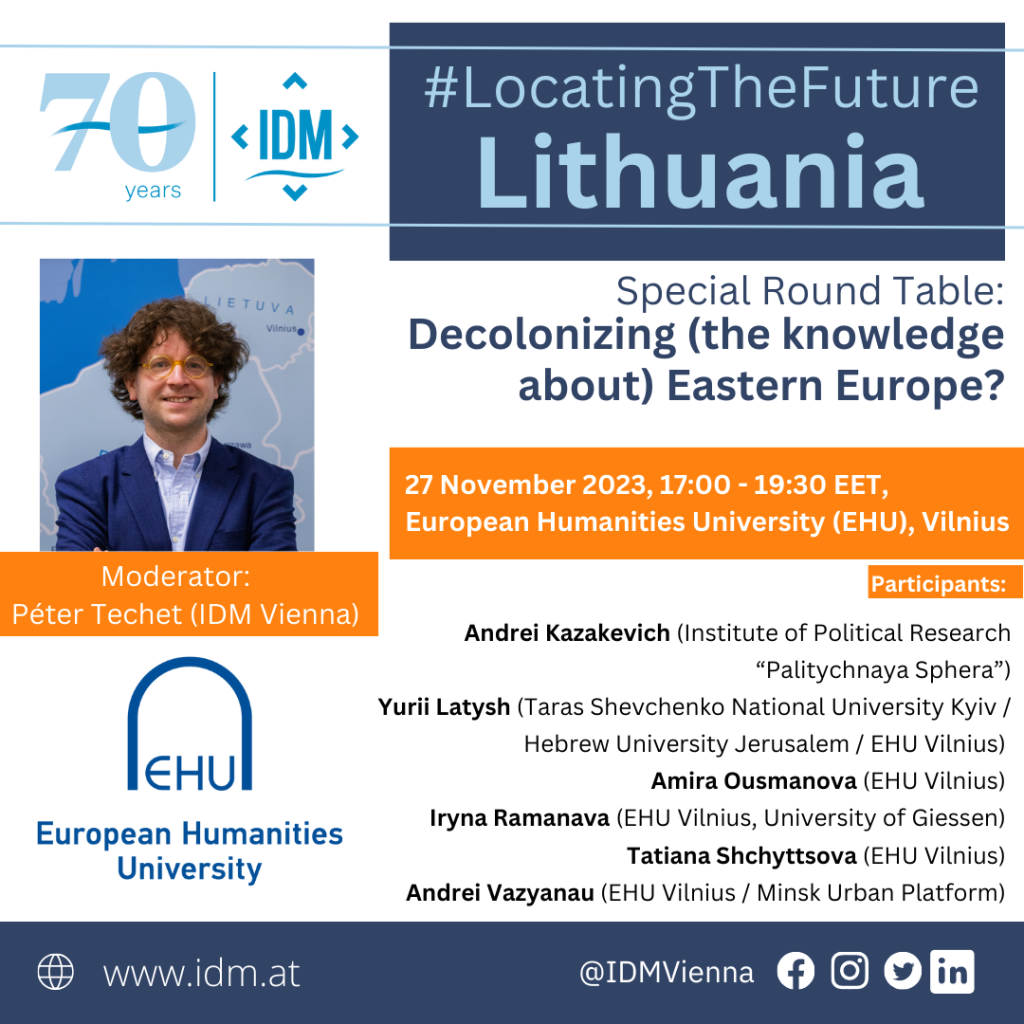
Joint event together with the Institute for the Danube Region and Central Europe (IDM Vienna)
Organizer: Péter Techet (IDM Vienna)
Is post-Soviet Eastern Europe a former colony? Can postcolonial approaches be applied to this region? Why is Russia still perceived in parts of the “Global South” as an anti-colonial alternative to the USA? The discussion, organized by the IDM at the European Humanities University (EHU) in Vilnius, focused on questions about how the postcolonial character of post-Soviet Eastern Europe can be understood.
After Iryna Ramanava (EHU) and Péter Techet (IDM) presented the topic, Tatiana Shchyttsova, a philosopher at EHU, spoke about the differences and similarities between the “Global South” and post-Soviet Europe. She emphasized that postcolonial approaches can provide a better understanding of the ongoing political developments in the region. While the Baltic States consider the Russian and Soviet periods as “occupation” to emphasize the foreignness of the Russian element, the Russian presence in Belarus and Ukraine led to a cultural hybridization. In this context, decolonization means the political, cultural, and linguistic detachment from Russia, which necessarily involves a certain nationalism in countries like Ukraine or Belarus. Nationalism is intended to achieve decolonization, not cultural and ethnic isolation. In this regard, Shchyttsova warned against “methodological nationalism.” The nationalizing aspects of decolonization are dialectical antitheses to colonial history that need to be overcome in a global context.
Almira Ousmanova, a social scientist at EHU, also addressed theoretical questions of decolonization in Eastern Europe, drawing on postcolonial and feminist approaches. She emphasized the necessity of the use of the Belarusian language in the cultural and academic fields. EHU is currently considering a change from Russian as the dominant language of instruction to English and Belarusian.
Both Shchyttsova and Ousmanova criticized that Western European scholarship still treats post-Soviet Eastern Europe in the context of Russia: Especially the “Global South” or certain parts of the Western European left fail to recognize the postcolonial character of Eastern Europe and the colonizing nature of Russia by understanding the colonization as an only Western phenomenon. Thus, Russia, including its Soviet past, can appear as an “anti-colonial power.” However, a deeper interest in post-Soviet Eastern Europe would reveal that colonization is multipolar, and it should not be reduced to the dichotomy of “West” vs. “Global South.”
Ukrainian historian Yurii Latysh, currently researching in Vilnius, presented the different political and legal attempts at decolonization in Ukraine. He critically views the removal of statues and street names of Russian authors. For a modern Ukraine seeking European integration, upholding minority rights, including those of Hungarian, Polish, or Romanian minorities, is strategically important to maintain good relations with EU countries. Latysh also explored whether decolonization and nationalization promote an ethnic or civic understanding of the nation.
Andrei Vazyanau, a sociologist at EHU and urban activist from Belarus, explored different possibilities of identification, noting that ethnicity, language, and nation are not synonymous in post-Soviet Eastern Europe. Therefore, nation-building does not require homogenization of language and an ethnic understanding of the nation.
In the debate, it was emphasized that post-Soviet Eastern Europe must be recognized by the Western academic community as a postcolonial space and by the politics of the “Global South” as a valid example of (de)colonization. However, the reason why post-Soviet Eastern Europe is not accepted as a history of colonization, as some participants argued, is related to the “racial” aspect: Colonization in Post-Soviet Eastern Europe did not rely on racial suppression and hierarchy.